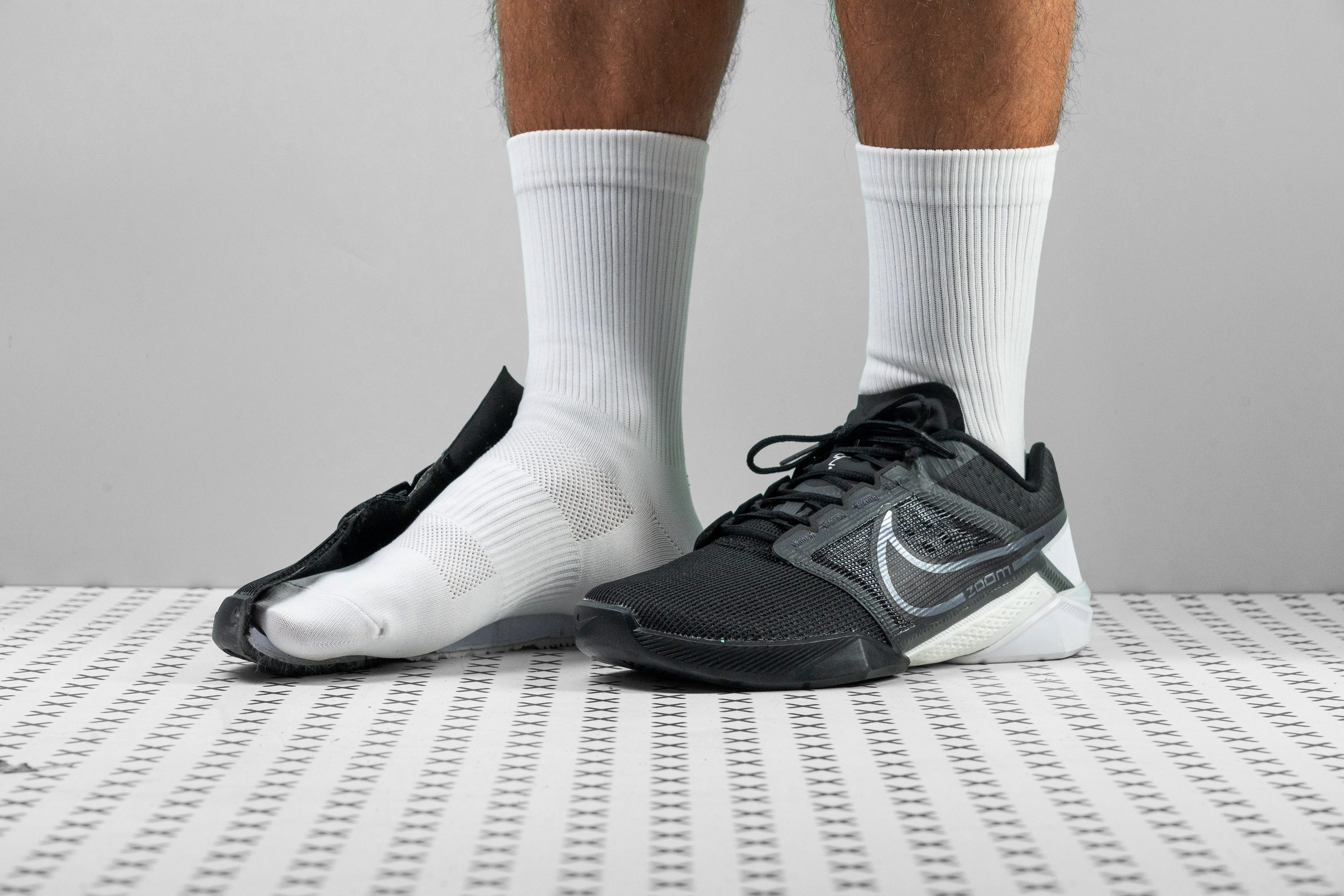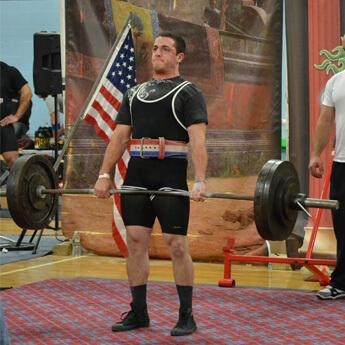Our verdict
- Top pick in best Nike workout shoes
- Top pick in best Nike gym shoes
Pros
- Bouncy Zoom Air in the forefoot
- Good for short runs
- Perfect for agility drills
- Stable for moderate lifting
- Excellent flexibility
- Amazingly breathable
- Durable outsole
- Reliable outsole traction
Cons
- Upper is not durable rope climbing
- Heavy for a "speed-oriented" trainer
Audience verdict
Comparison
The most similar training shoes compared
+ + Add a shoe | |||||
|---|---|---|---|---|---|
| Audience score | 82 Good! | 72 Decent! | 87 Great! | 92 Superb! | |
| Price | £150 | £150 | £130 | £140 | |
| Use | CrossfitWorkoutCross-trainingGymHIITSkipping rope | CrossfitWorkoutCross-trainingGymHIITSkipping rope | CrossfitWorkoutCross-trainingGymHIITSkipping ropeAll sports | CrossfitWorkoutCross-trainingGymHIITSkipping ropeAll sports | |
| Shock absorption | Low | Moderate | - | Moderate | |
| Energy return | High | Moderate | - | Moderate | |
| Traction | Moderate | Low | - | - | |
| Drop lab | 7.7 mm | 6.4 mm | 4.8 mm | 4.8 mm | |
| Heel stack lab | 22.9 mm | 24.1 mm | 22.3 mm | 23.6 mm | |
| Forefoot | 15.2 mm | 17.7 mm | 17.5 mm | 18.8 mm | |
| Weight lab | 12.1 oz / 342g | 10.5 oz / 298g | 12.3 oz / 350g | 12.3 oz / 350g | |
| Lightweight | ✗ | ✓ | ✗ | ✗ | |
| Breathability | Breathable | Moderate | Moderate | Warm | |
| Width / fit | Medium | Wide | Narrow | Narrow | |
| Toebox width | Medium | Wide | Medium | - | |
| Size | True to size | - | Slightly large | Half size small | |
| Midsole softness | Balanced | Firm | Balanced | Firm | |
| Stiffness | Moderate | Moderate | Stiff | Stiff | |
| Torsional rigidity | Flexible | Stiff | Stiff | Moderate | |
| Heel counter stiffness | Moderate | Flexible | Moderate | Moderate | |
| Toebox durability | Bad | Bad | Good | - | |
| Heel padding durability | Decent | Decent | Bad | - | |
| Outsole durability | - | Good | Decent | - | |
| Midsole width - forefoot | Average | Average | Average | Average | |
| Midsole width - heel | Average | Average | Average | Average | |
| Widths available | Normal | NormalWide | Normal | Normal | |
| Insole thickness | Very thick | Average | Average | ||
| Outsole thickness | Thick | Average | Average | Average | |
| Outsole hardness | Average | - | Average | Average | |
| Heel tab | None | None | Finger loop | None | |
| Tongue: gusset type | Both sides (full) | Both sides (full) | None | None | |
| Tongue padding | Very thin | Average | Average | Thin | |
| Ranking | #28 Bottom 24% | #35 Bottom 5% | #14 Top 38% | #4 Top 11% | |
| Popularity | #21 Bottom 43% | #17 Top 46% | #27 Bottom 27% | #26 Bottom 29% |
Who should buy
Having tested the Metcon Turbo 2 in both the gym and the lab, we think that it is most suitable for the following:
- gymgoers who incorporate short runs and a lot of agility exercises in their programmes
- people who do light to moderate weightlifting
- athletes who prefer more flexible trainers
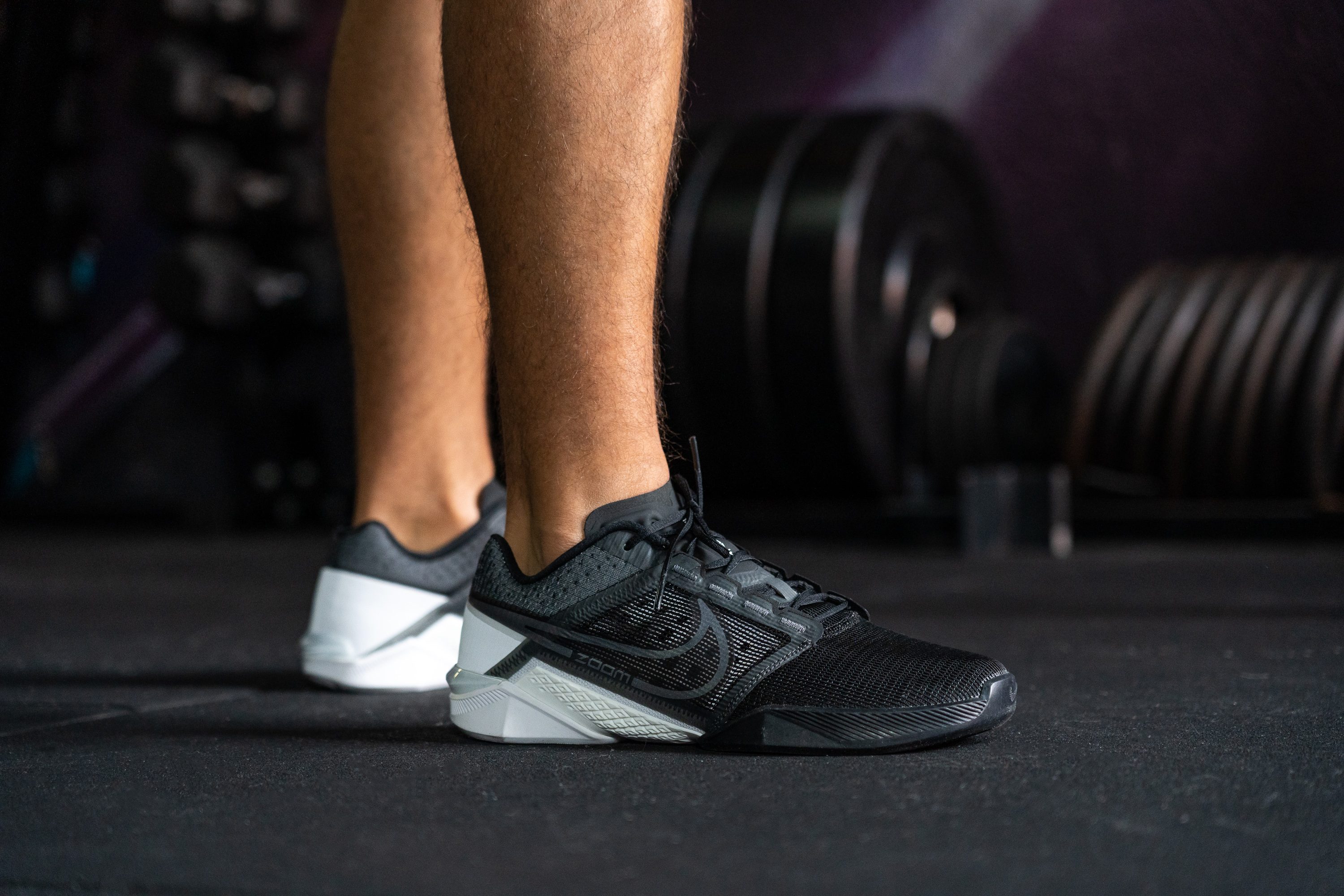
Who should NOT buy
We found that this Nike trainer hasn't got the durability or side grip for rope climbing. If this workout bit is a must in your regimen, we recommend the Nike Metcon 9 instead.
Even though there is a slight change in its name, the Nike Zoom Metcon Turbo 2 is a follow-up to the Nike React Metcon Turbo. If you have tried and liked how the React version performs, it's better to just stick to it since it's most likely sold at much lower prices now. It is also a bit lighter than the new edition. The current version performs only slightly better than that.
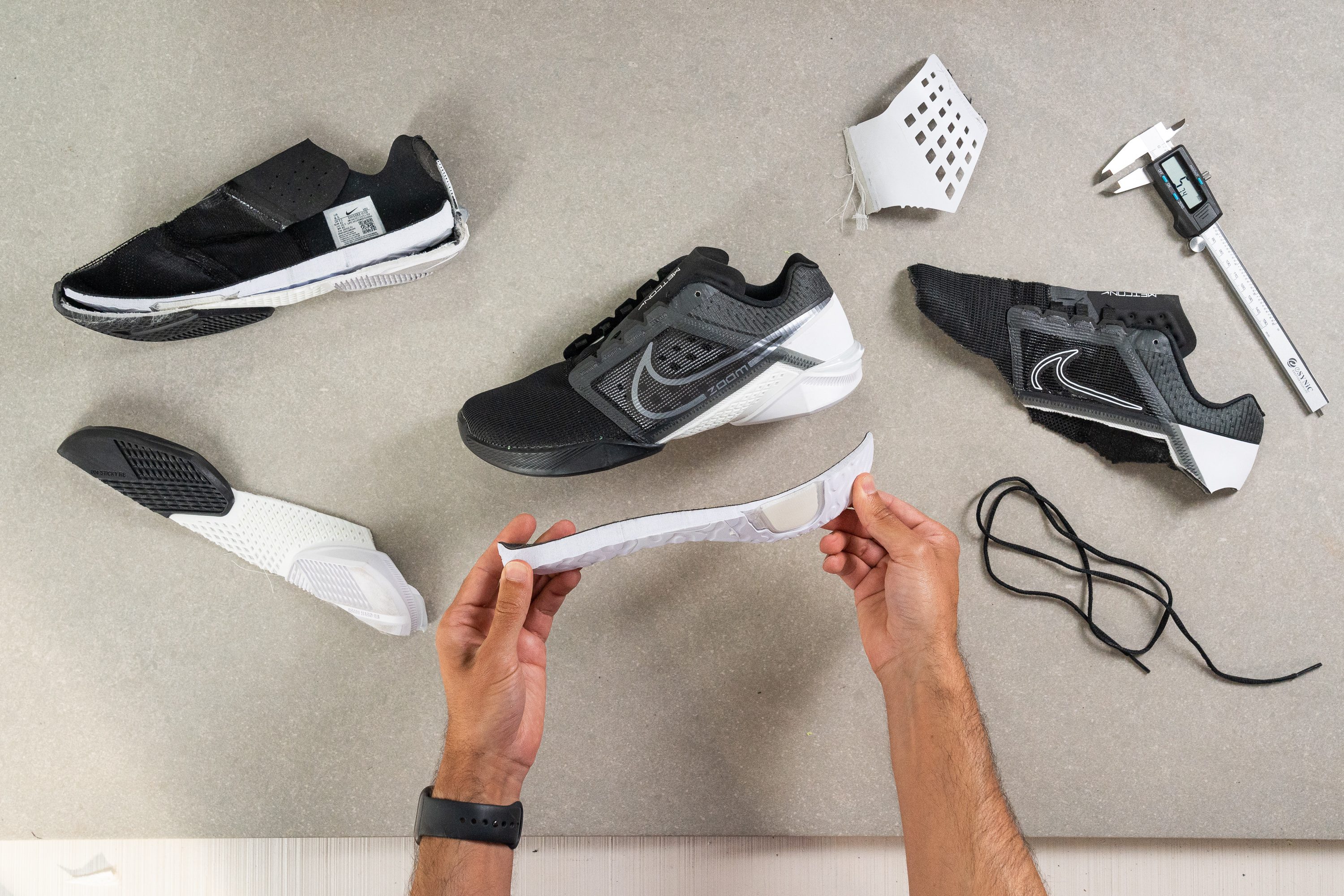
Cushioning
Shock absorption
The Metcon Turbo 2 comes very close to feeling minimalist with its next-to-no underfoot cushioning.
Measuring the shoe's shock absorption, we recorded some of the lowest readings in the training category - 76 SA in the heel and 38 SA in the forefoot. This translates into increased proprioception and nimble footwork in the Turbo 2.
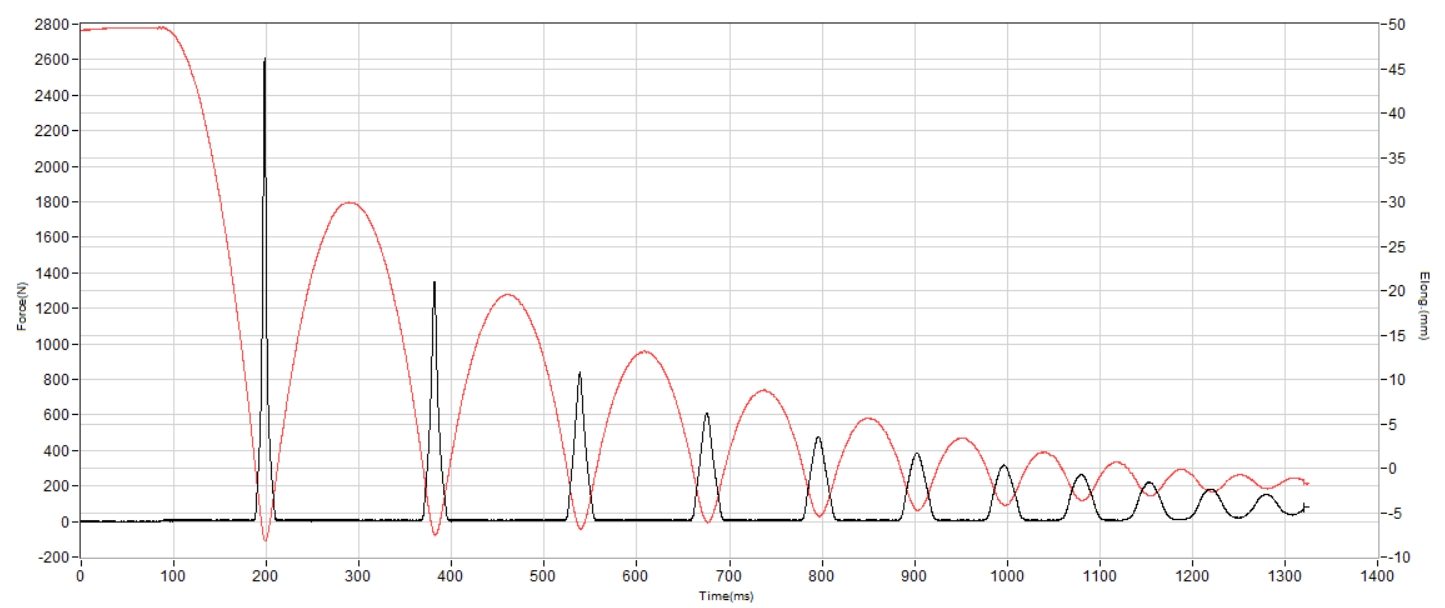
| Zoom Metcon Turbo 2 | 76 SA |
| Average | 79 SA |
Energy return
Because there is so little foam to absorb the energy, the Nike Metcon Turbo 2 returns most of your force back to your feet, making the training experience highly agile and dynamic.
What's more, the shoe packs a Zoom Air unit in the forefoot for added propulsiveness at the toe-offs. This is reflected in the shoe's above-average energy return of 64.7% in the forefoot.
| Zoom Metcon Turbo 2 | 63.0% |
| Average | 54.8% |
Heel stack
The amount of cushioning is pretty average in this Nike Metcon variation. Using a calliper, we measured the heel stack at 22.9 mm which is a couple of millimetres thicker than the OG Metcons and a little thinner than the Free Metcons.
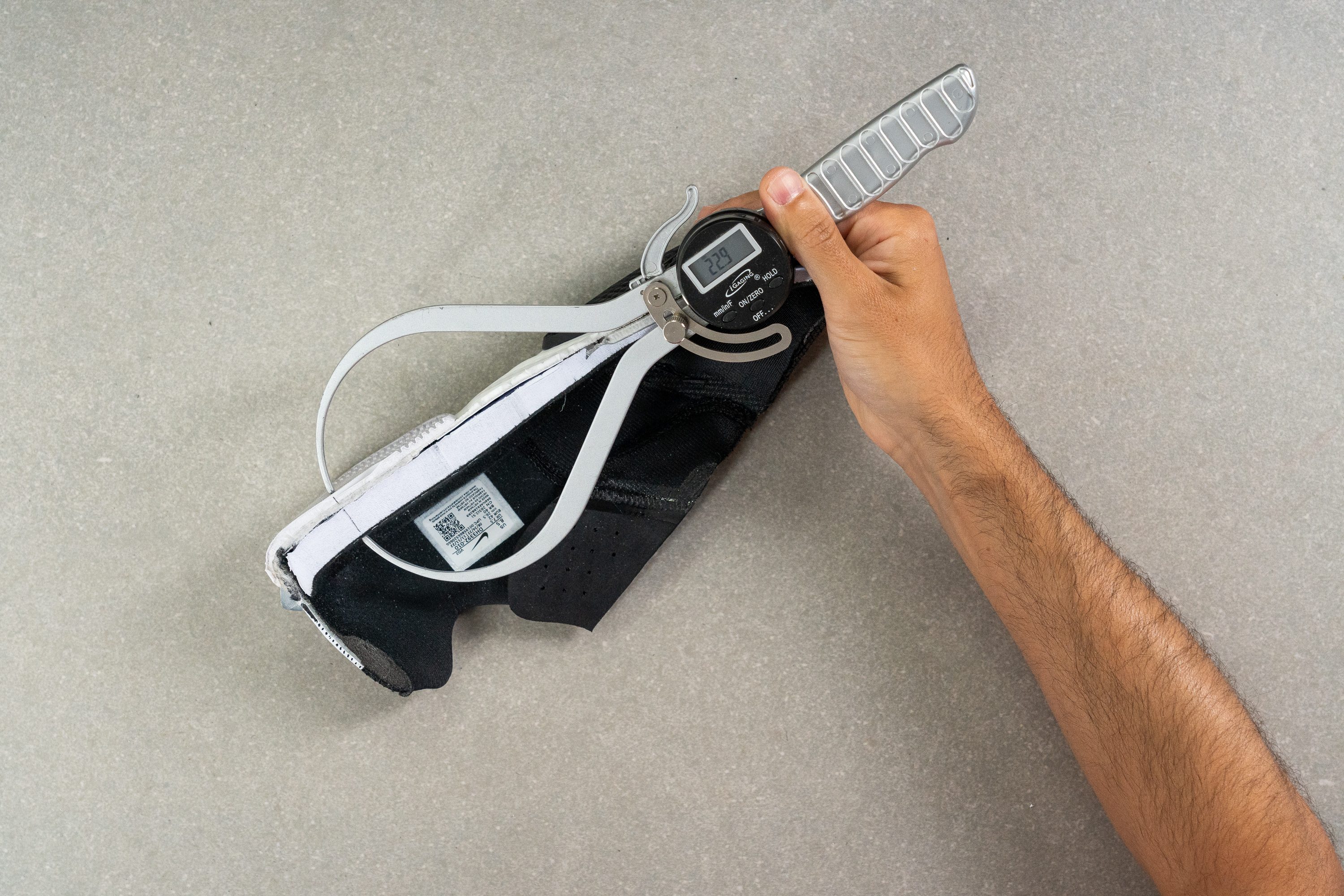
To us, this felt like enough cushioning for short runs (less than 3 miles) and for the repetitive jumps we performed in this training shoe.
| Zoom Metcon Turbo 2 | 22.9 mm |
| Average | 24.3 mm |
Forefoot stack
In the forefoot, the foam layer gets thinner than average.
A calliper reading of 15.3 mm left us perplexed because it definitely felt more cushioned in our gym tests.
Apparently, the trick is done by a Zoom Air unit under the toes. But more on that below.
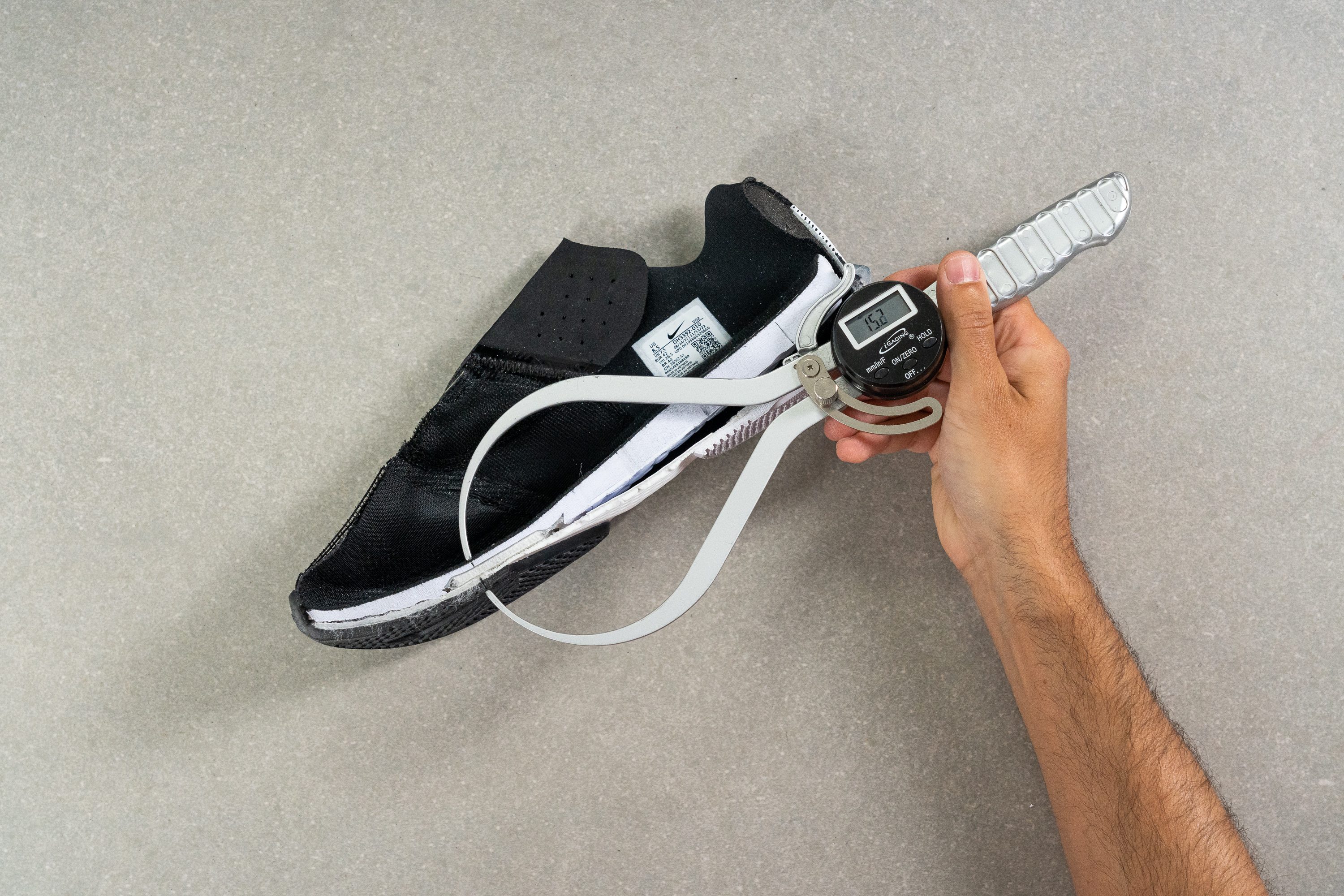
| Zoom Metcon Turbo 2 | 15.2 mm |
| Average | 18.1 mm |
Drop
The difference in stack heights gave us a drop of 7.7 mm! That's pretty high for a typical cross-trainer and is actually on par with our running shoes.
Being 3.7 mm taller than what's officially claimed by Nike (4 mm), we think that this kind of discrepancy is unacceptable.
The higher drop makes the shoe more running-friendly but it also detracts from the grounded feel that many gymgoers might expect from a 4-mm shoe.
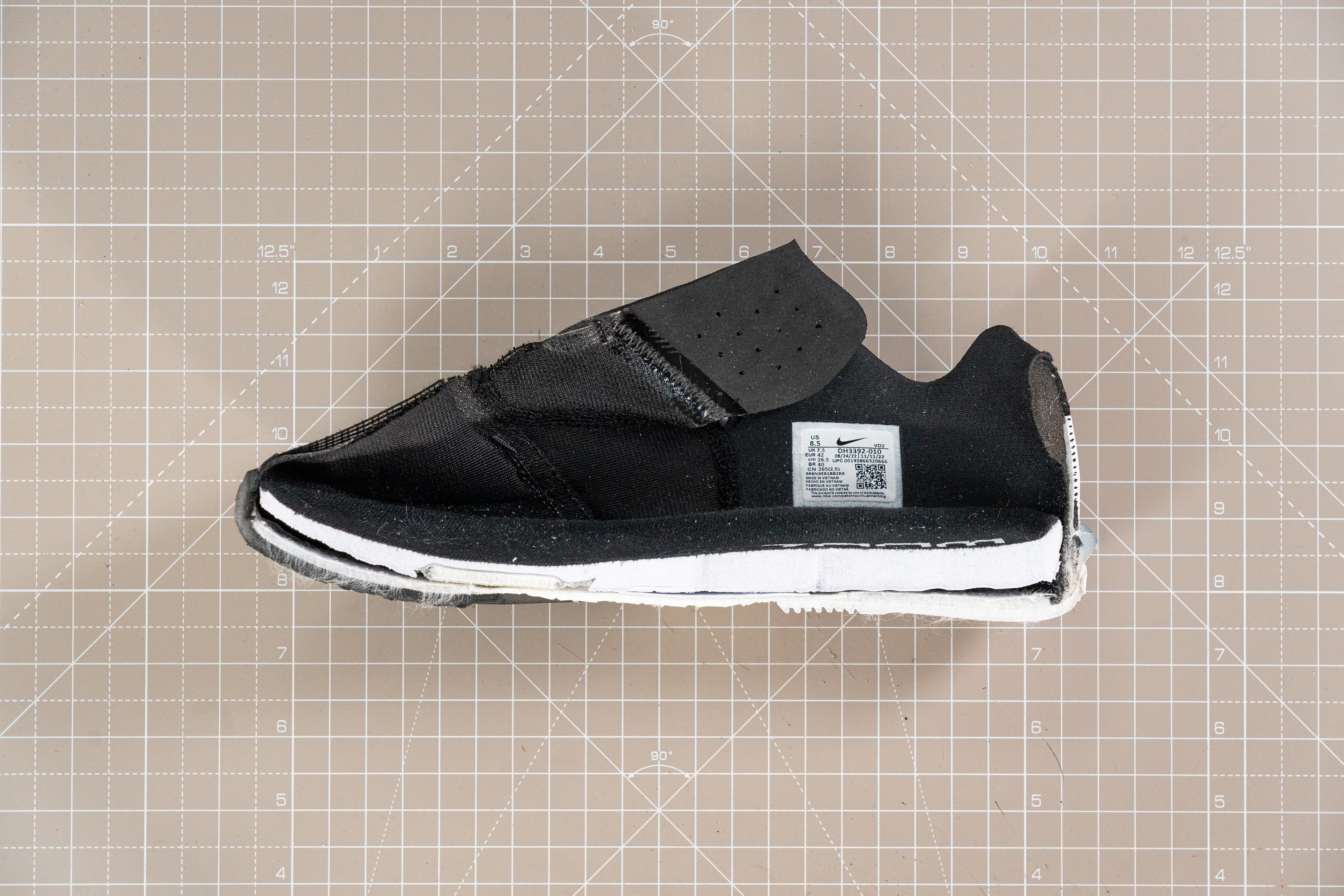
| Zoom Metcon Turbo 2 | 7.7 mm |
| Average | 6.3 mm |
Midsole softness
The primary cushioning in this Nike trainer is offered by the brand's reputable React foam.
Using a durometer to measure its softness, we discovered that at 22.4 HA, it is actually 21% softer than what we see in training shoes on average. Great news for those planning to use this trainer on a treadmill!
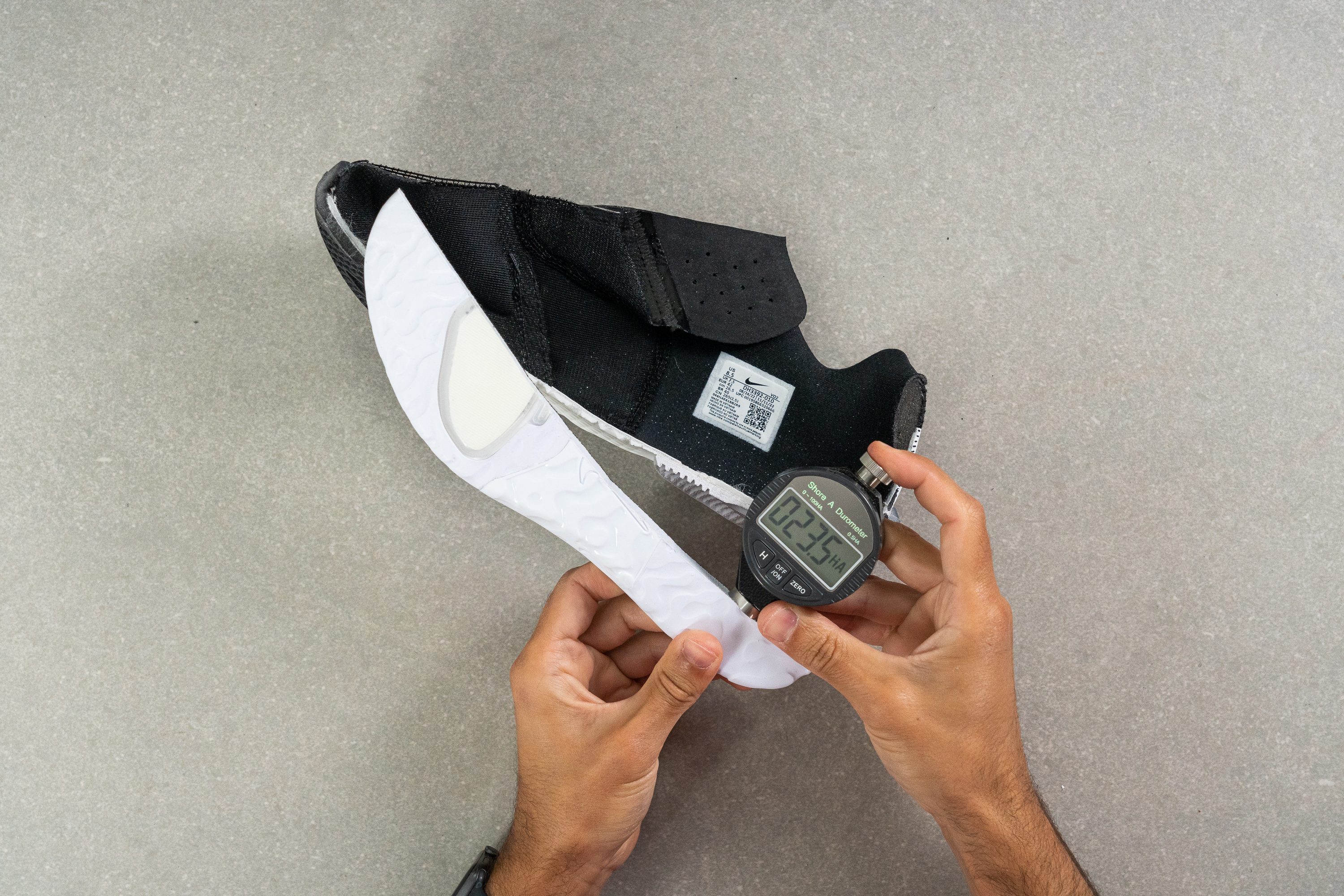
What's more, thanks to the Zoom Air unit embedded into the forefoot, we also felt a very welcome bounce. We thoroughly enjoyed this extra spring when skipping rope and doing other types of jumpy cardio.
If we have to pinpoint the shoe's highlight, it would be the Zoom. You don't experience this kind of bounce in other Metcons or most other cross-trainers for that matter.
The only shoe that could compete with the Metcon Turbo, in our opinion, is the Nike SuperRep 3.
| Zoom Metcon Turbo 2 | 22.4 HA |
| Average | 27.8 HA |
Size and fit
Size
Nike Zoom Metcon Turbo 2 fits true to size (13 votes).
Toebox width - widest part
We found that the Metcon Turbo 2 fits true to size but there isn't too much wiggle room in the shoe's toebox for wide feet.
To assess the forefoot volume, we measured its widest part as well as the width around the big toe.
In the former, the caliper shows a reading of 101.1 mm. This is exactly the average of our tested trainers.
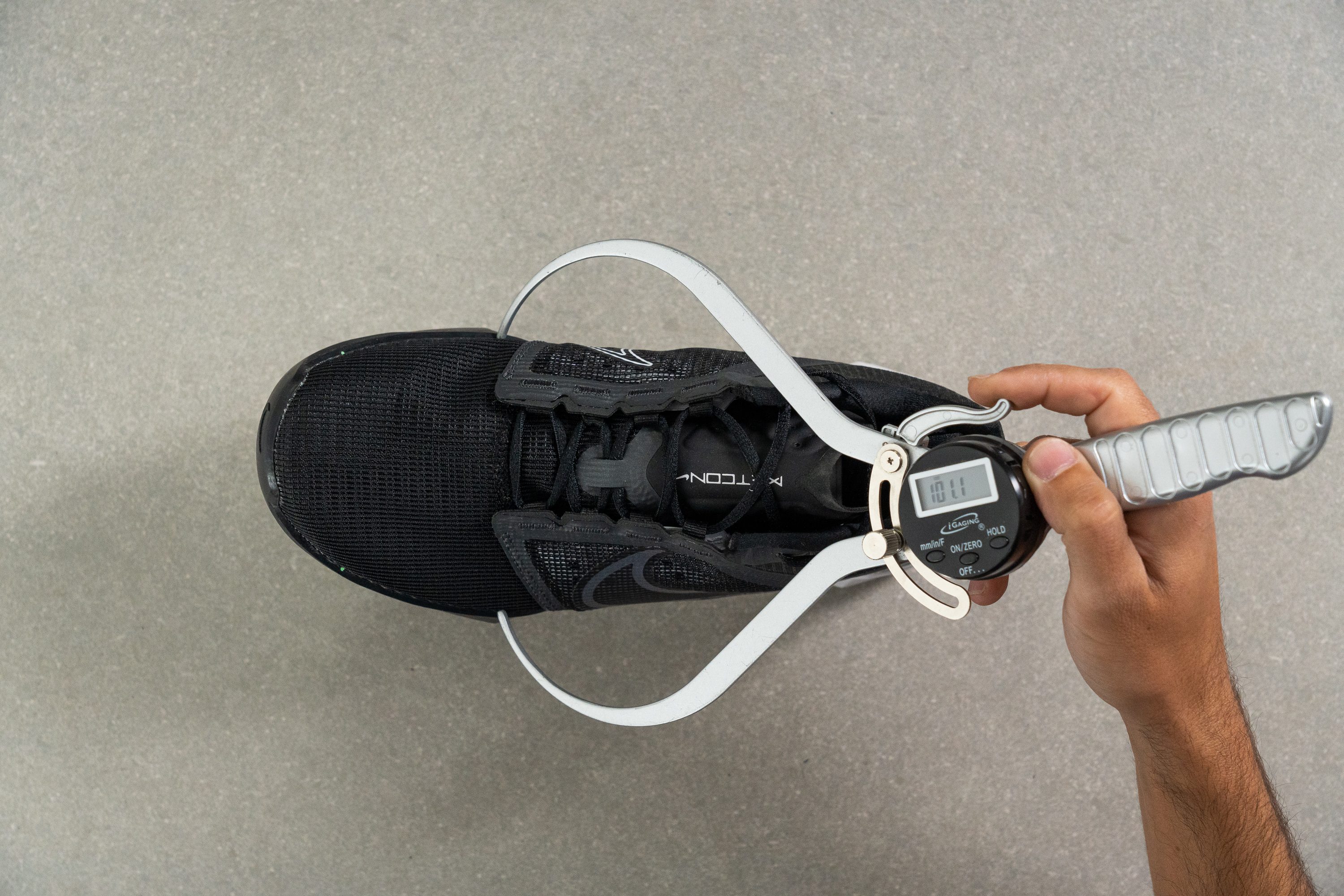
This test follows an older methodology, which is why you don't see recently tested shoes in the chart. Results from different methodologies can not be compared.
| Zoom Metcon Turbo 2 | 101.1 mm |
| Average | 100.6 mm |
Toebox width - big toe
The toebox doesn't get narrower than average toward the toes either. The caliper shows 78.9 mm here.
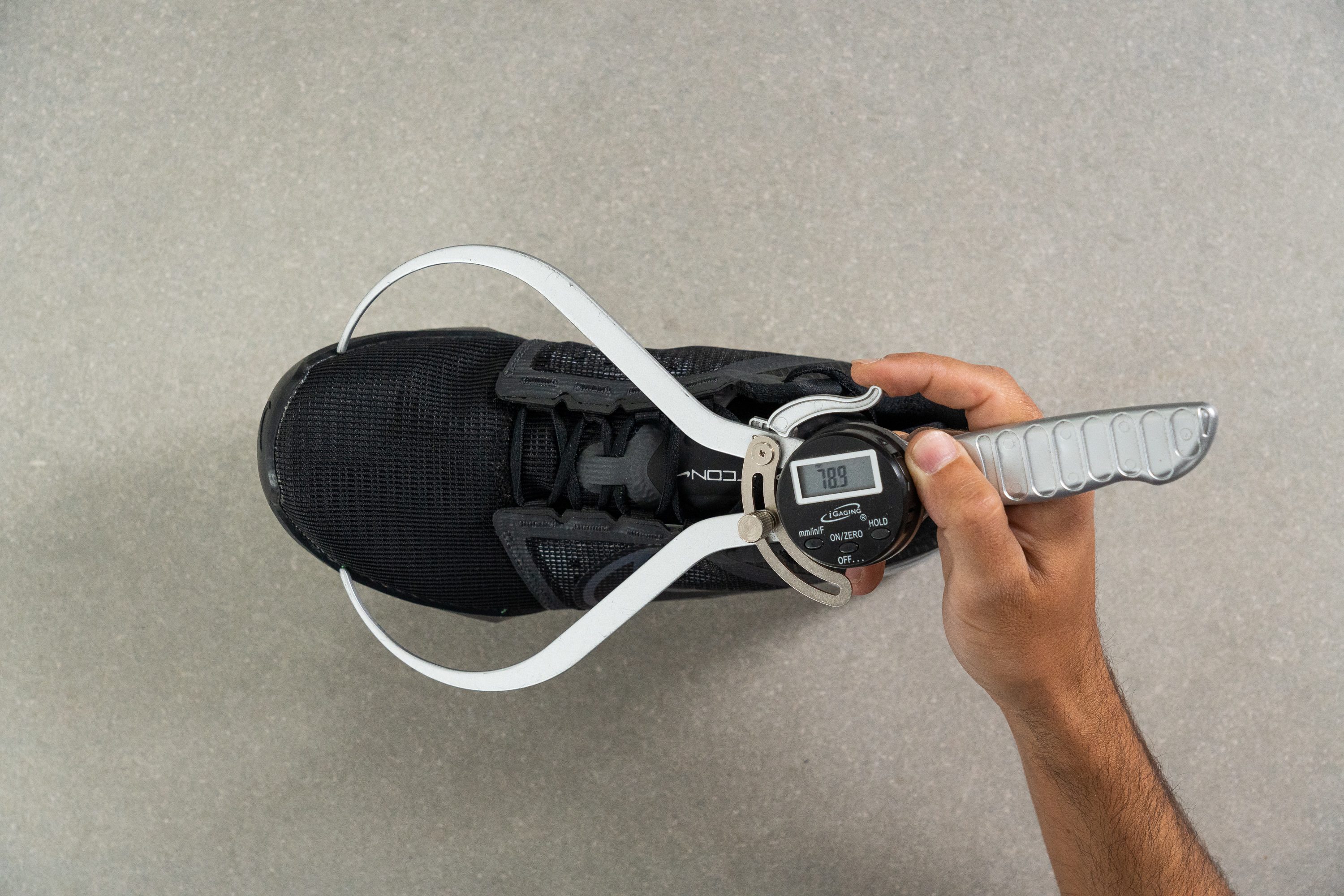
This test follows an older methodology, which is why you don't see recently tested shoes in the chart. Results from different methodologies can not be compared.
| Zoom Metcon Turbo 2 | 78.9 mm |
| Average | 78.8 mm |
Traction / Grip
Traction test
Designed for dynamic movements, we are happy to report that the Metcon Turbo 2 has a matching level of traction. Testing its stopping power in the forefoot, our grip testing machine recorded a good friction score of 0.34.
This means that you can make quick starts, stops, and pivots confidently in this Nike trainer. It has great adherence with typical gym floorings like rubber and wood.
| Zoom Metcon Turbo 2 | 0.34 |
| Average | 0.33 |
Outsole design
With its forefoot and heel sections separated, the Metcon Turbo 2's sole is reminiscent of a jazz shoe. It features two types of rubber and a multi-textured pattern to provide an effective bite for fast-paced workouts.
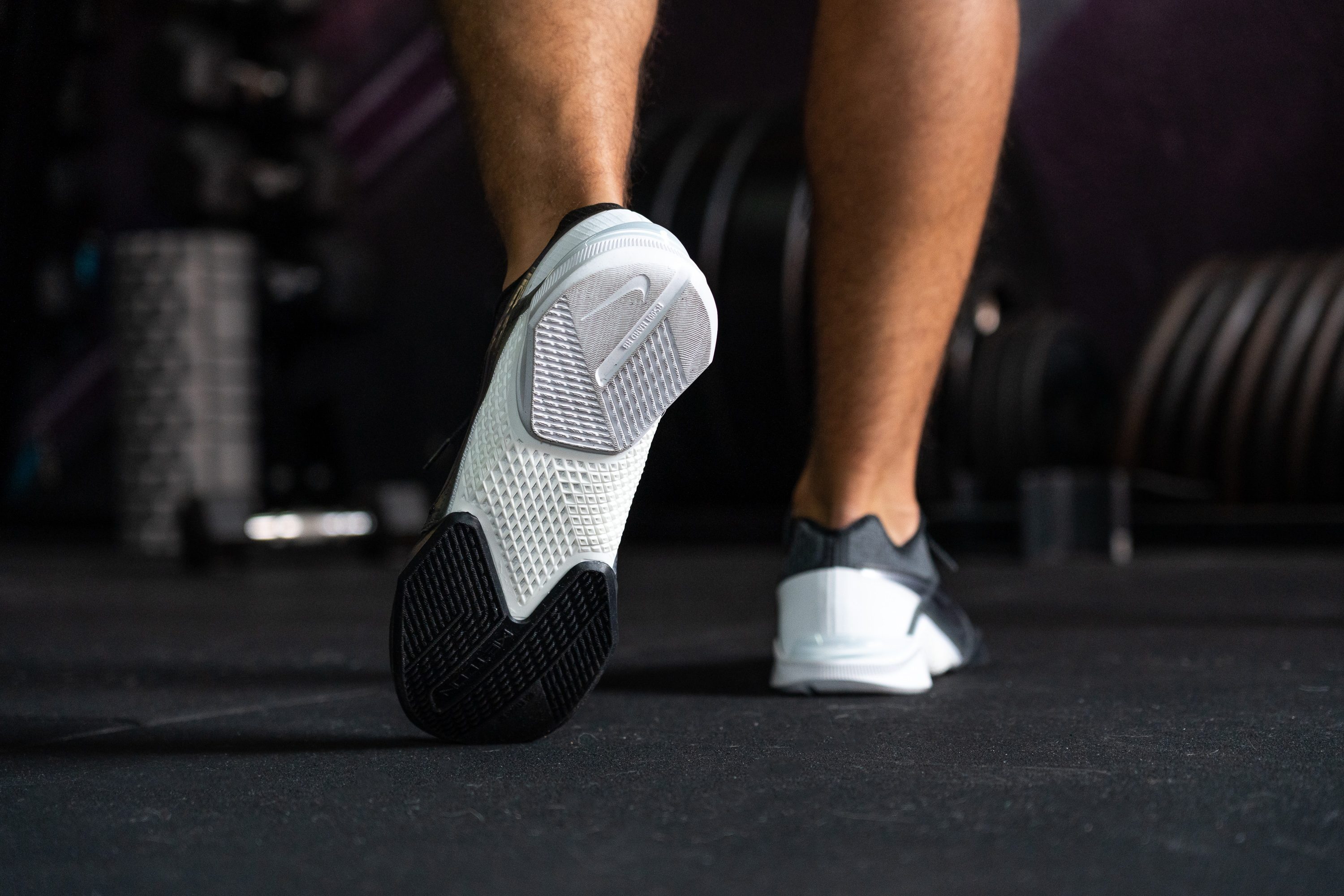
Flexibility / Stiffness
As mentioned above, Nike came up with a tricky design to fuse flexibility and stability in the Metcon Turbo 2.
Testing the shoe's pliability with a flexibility testing machine, we checked how much force it takes to bend it to a 30-degree angle. Turns out, only 9.0N! This is notably less than the average!
Wow, maybe next time we will try and practice some jazz moves in this shoe. But until then, planks, burpees, and lunges are all perfectly accommodated with this flexible trainer.
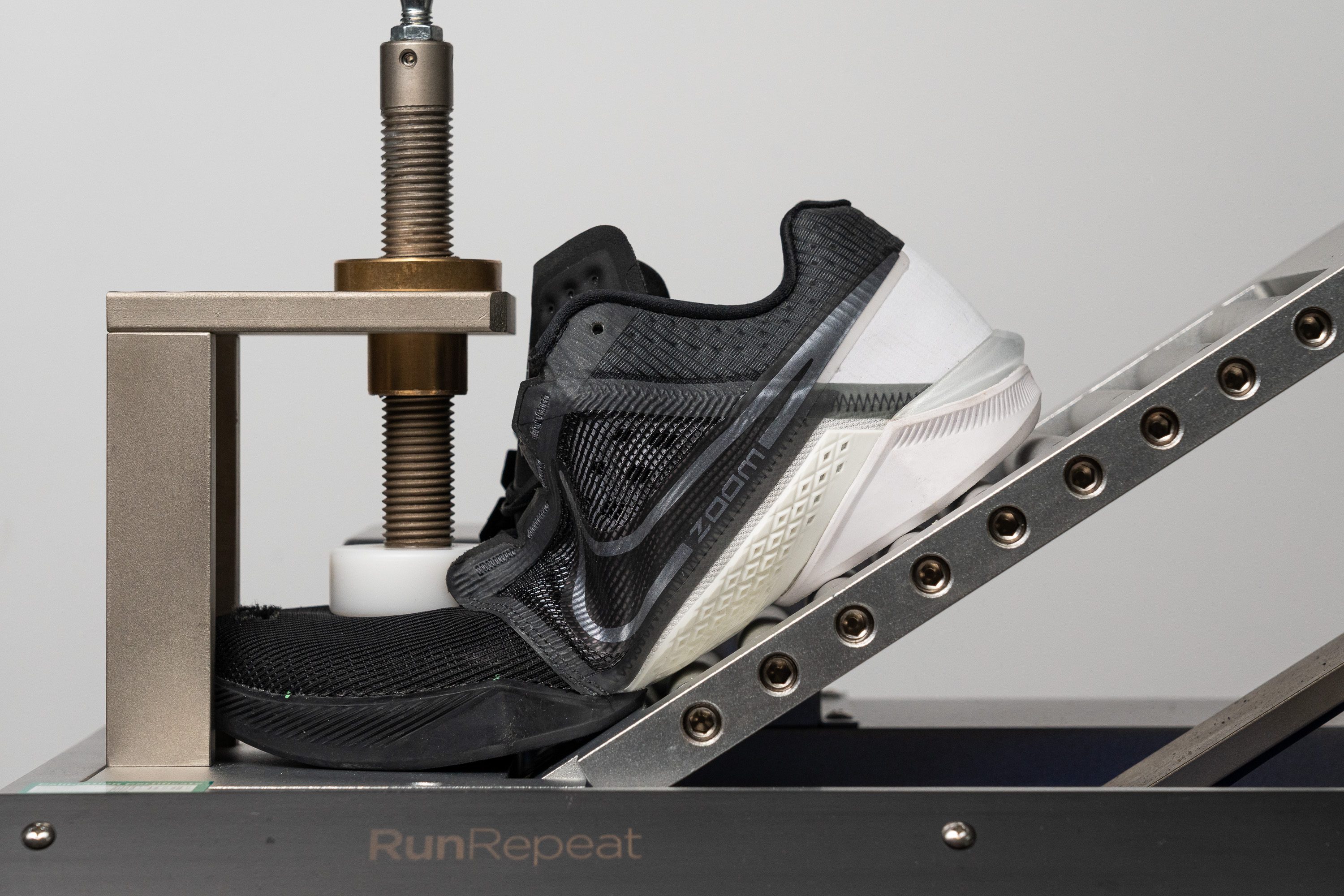
| Zoom Metcon Turbo 2 | 9.0N |
| Average | 10.2N |
Weight
Now this is a headscratcher.
Marketed as a shoe that's all about speed and lightness, the shoe left us baffled. How come the Metcon TURBO weighs more than the original Metcon?
Tipping the scales at 12.1 oz (342g) in a men's US size 9, we found that the Metcon Turbo 2 is:
- 0.2 oz (5.7g) heavier than the Metcon 8
- 0.9 oz (25g) heavier than training shoes on average!
If you want a truly lightweight Metcon variation, get the Nike Free Metcon 5 (10.5 oz/298g).
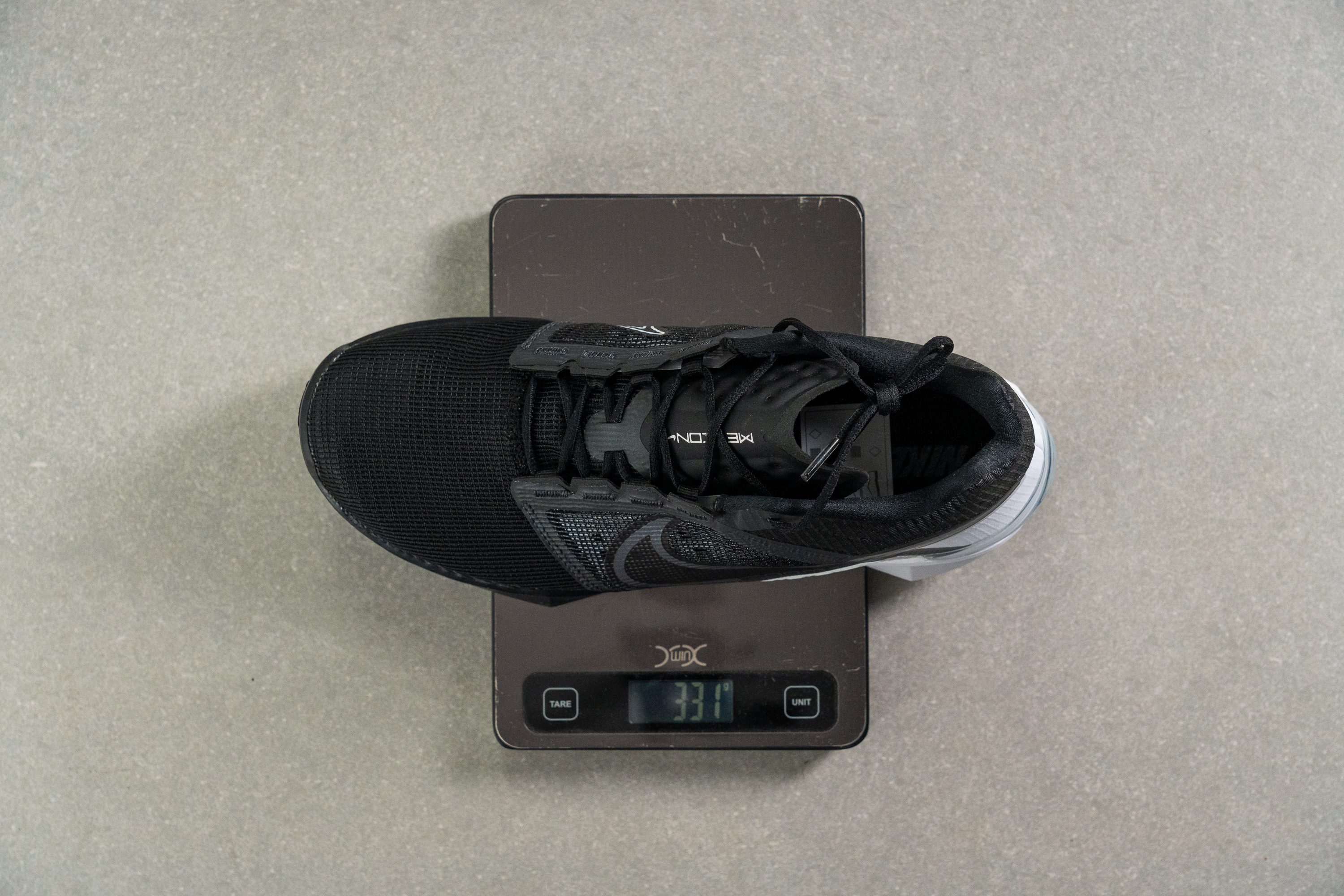
| Zoom Metcon Turbo 2 | 12.1 oz (342g) |
| Average | 10.7 oz (304g) |
Breathability
If keeping your feet nice and fresh all throughout the workout is a priority, the Metcon Turbo 2 is the way to go!
It is among the few ultra-breathable trainers in our catalogue. We hope that the video below helps you feel how ventilated the shoe is even through the screen.
For this test, we are pumping smoke through the shoe's upper while blocking the shoe mouth entirely to assess how much air passes through the material itself. This Nike trainer gets a well-deserved 5 out of 5!
To back it up, we also put the shoe against a light source. This video shows the toebox's impressive transparency as well as the large perforations on the sides.
In addition, we turned to a microscope for a close-up view of the mesh itself. We can see that there are plenty of ventilation holes in between the numerous threads.
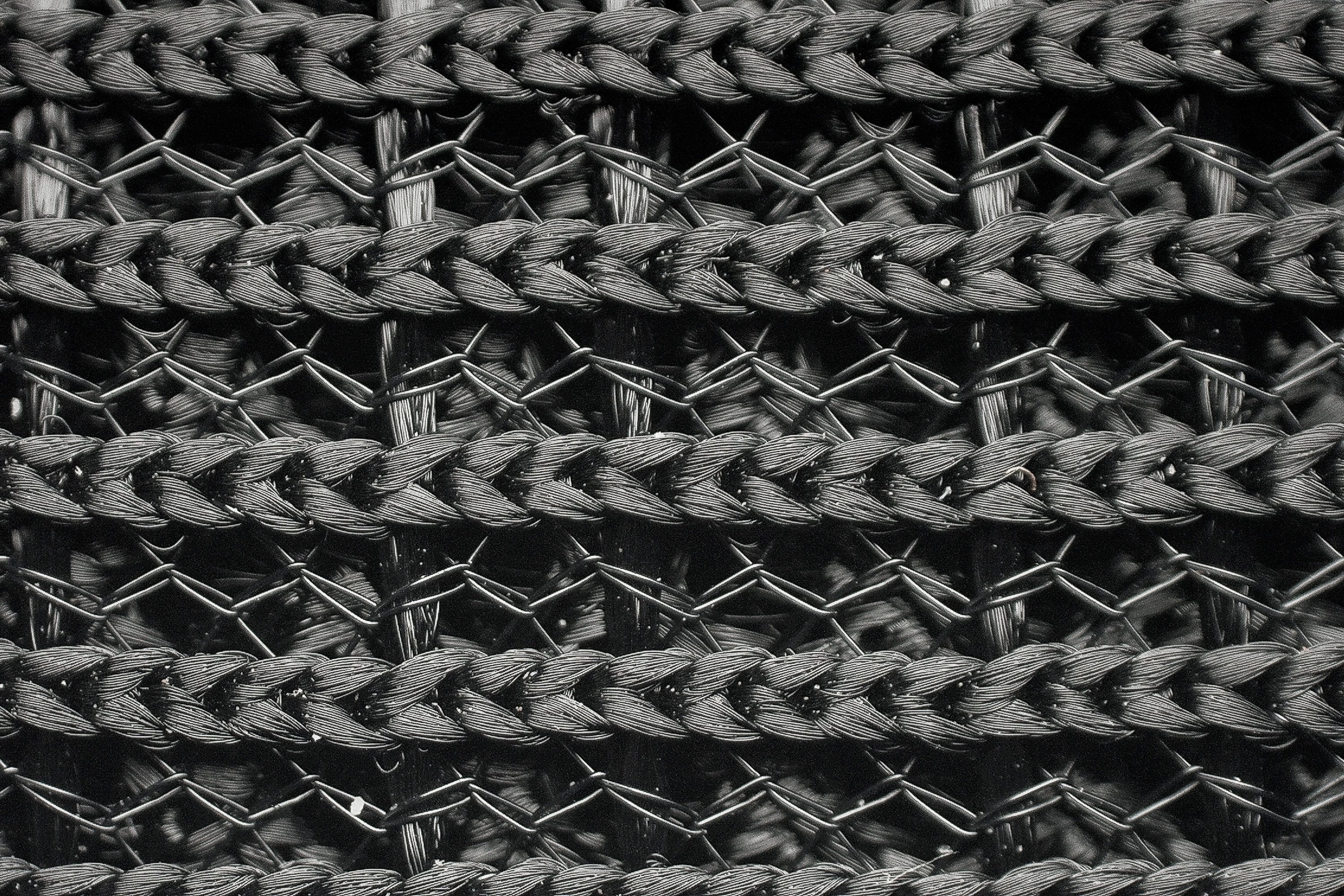
| Zoom Metcon Turbo 2 | 5 |
| Average | 3.6 |
Stability
Lateral stability test
It is true that you can't have it all.
But, in our opinion, the Nike Zoom Metcon Turbo 2 came pretty dang close to giving it all! And by "all" we mean cushioning AND stability.
The shoe's low profile, wide base, and sturdy caging around the heel worked very well together to create a necessary level of stability for us. But do keep in mind that this is not a dedicated lifting shoe by any means!
If setting PBs is your primary focus, the Nike Metcon 8 or the Romaleos 4 are exactly what you need.
Torsional rigidity
Designed with agility in mind, the construction of the Metcon Turbo 2 reminded us of a jazz shoe in a way.
The shoe's platform is split into two, one in the forefoot and one in the heel, which creates more flex and manoeuvrability for the wearer.
Because of that, torsional rigidity is close to zero in this training shoe. We rated it with the lowest score of 1 out of 5.
| Zoom Metcon Turbo 2 | 1 |
| Average | 2.9 |
Heel counter stiffness
But the lack of rigidity in the midfoot is very well compensated for by the heel counter stiffness. In our manual assessment, we rated the stiffness as 3 out of 5, which is a little above the average for cross-trainers.
This area is responsible for holding the heel and ankle firmly in place, preventing potential wobble.
| Zoom Metcon Turbo 2 | 3 |
| Average | 2.7 |
Midsole width - forefoot
And if you are still not convinced of the shoe's stability, have a look at how wide its base is!
We measured the widest part of the forefoot at 112 mm which is wider than average.
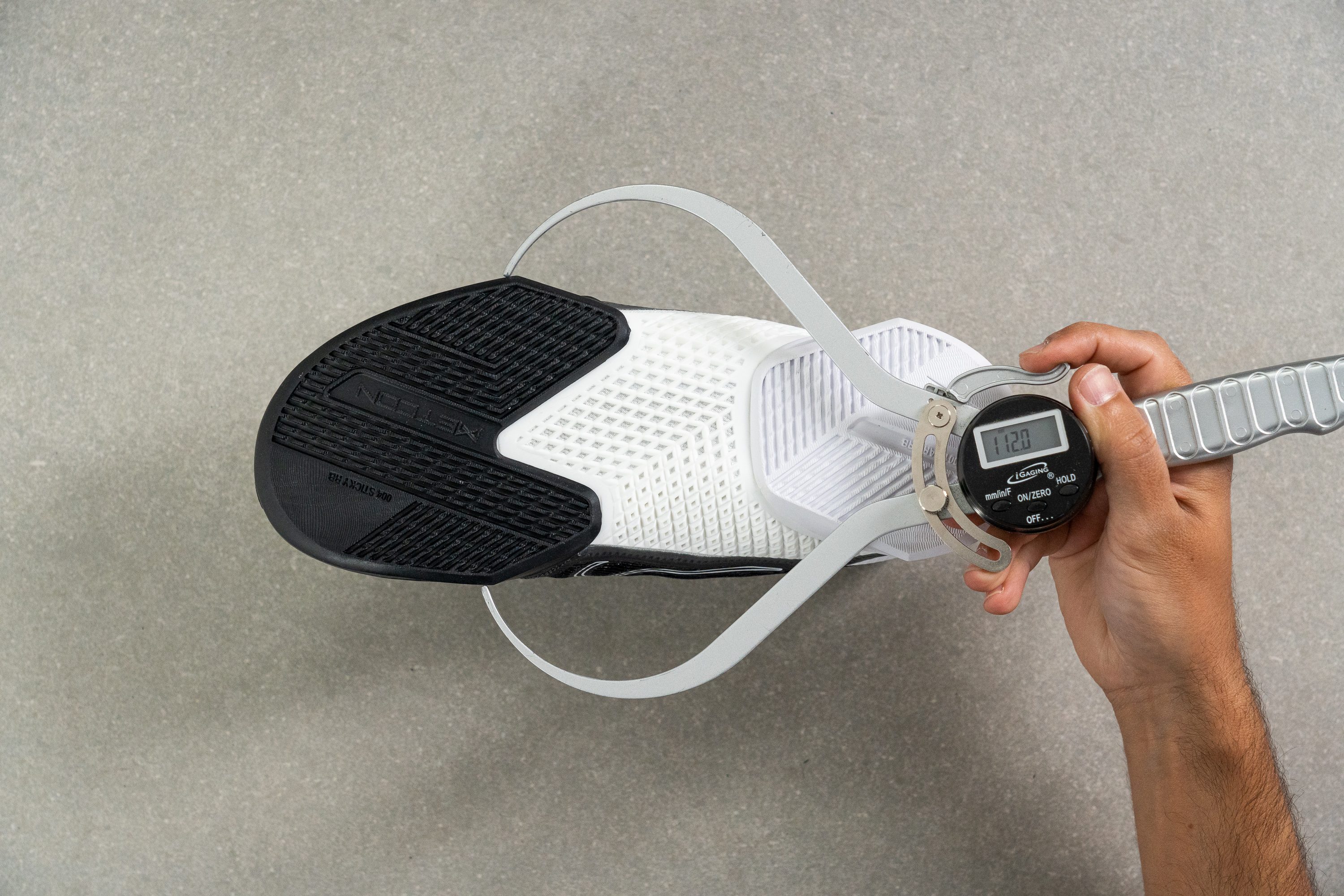
| Zoom Metcon Turbo 2 | 112.0 mm |
| Average | 110.9 mm |
Midsole width - heel
Back in the heel, the widest part turned out to be 88.9 mm. This is also wider than the average.
This is what makes the Metcon Turbo 2 more stable for lifting and, as a result, more versatile overall.
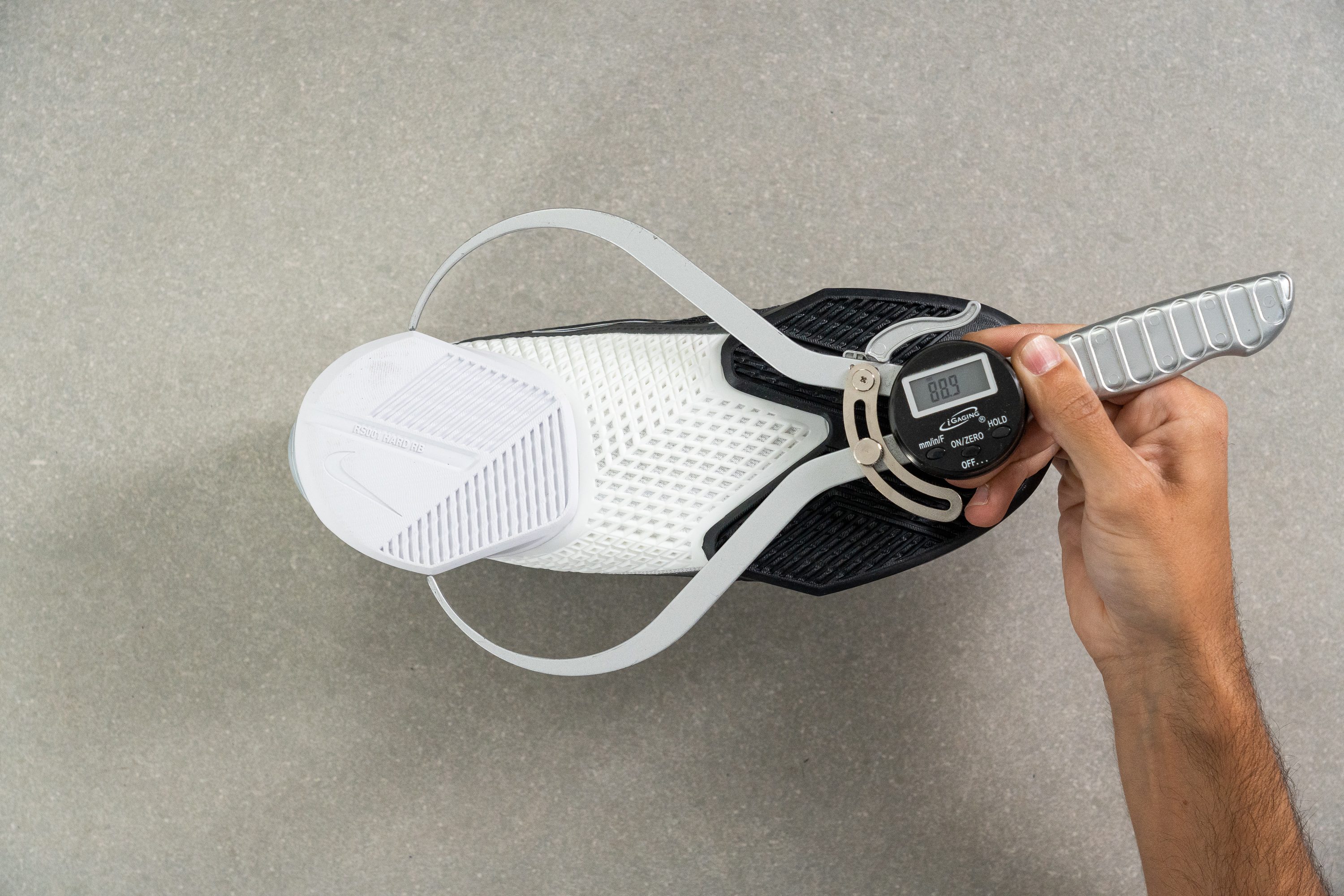
| Zoom Metcon Turbo 2 | 88.9 mm |
| Average | 86.9 mm |
Durability
Toebox durability
And just like that, the Nike Zoom Metcon Turbo 2 failed miserably in our upper durability test.
Even though the shoe bravely resisted our Dremel for the first couple of seconds, it ended up with a sizable hole after the entire 12 seconds. Thus, we rated it as low as 1 out of 5.
This is to be expected of a highly breathable upper but unfortunately, it puts some limits on the shoe's usability. It is a no-go for rope climbs and other highly abrasive exercises.
If you need a real beast of a cross-trainer, we recommend the Nike Metcon 8. After 12 seconds under the Dremel with the same speed (10K RPM) and force (3.2N) applied, we only saw wear on the topmost protection layer.
| Zoom Metcon Turbo 2 | 1 |
| Average | 2.7 |
Heel padding durability
The Metcon Turbo 2 did slightly better in the heel collar. The wear was less devastating than in the toebox.
We gave this portion of the upper 2 out of 5.
| Zoom Metcon Turbo 2 | 2 |
| Average | 2.9 |
Outsole hardness
But looking at the outsole gave us some optimism about the Metcon Turbo 2's wear resistance.
One important criterion is the hardness of its rubber. With a reading of 86.5 HC on the durometer, it is among the hardest outsoles.
A very small percentage of our lab-tested training shoes goes above 85 HC.
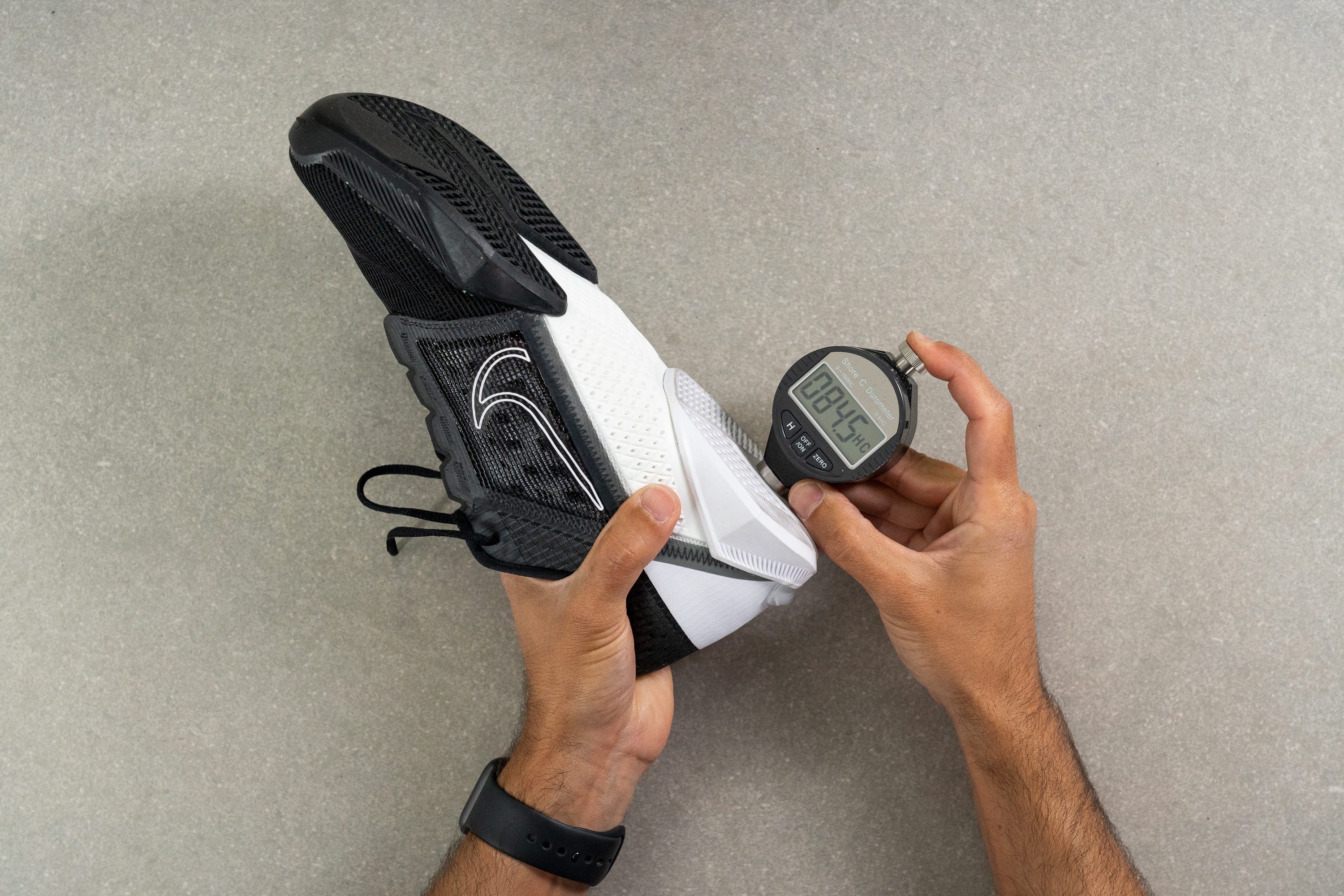
| Zoom Metcon Turbo 2 | 86.5 HC |
| Average | 83.2 HC |
Outsole thickness
In addition, the outsole layer of the Metcon Turbo 2 is THICK!
Our calliper shows 4.7 mm, which is a rare sight. Therefore, we think you can even take this Nike trainer out for an outdoor workout.
Just don't get carried away because the shoe's upper is still pretty frail.
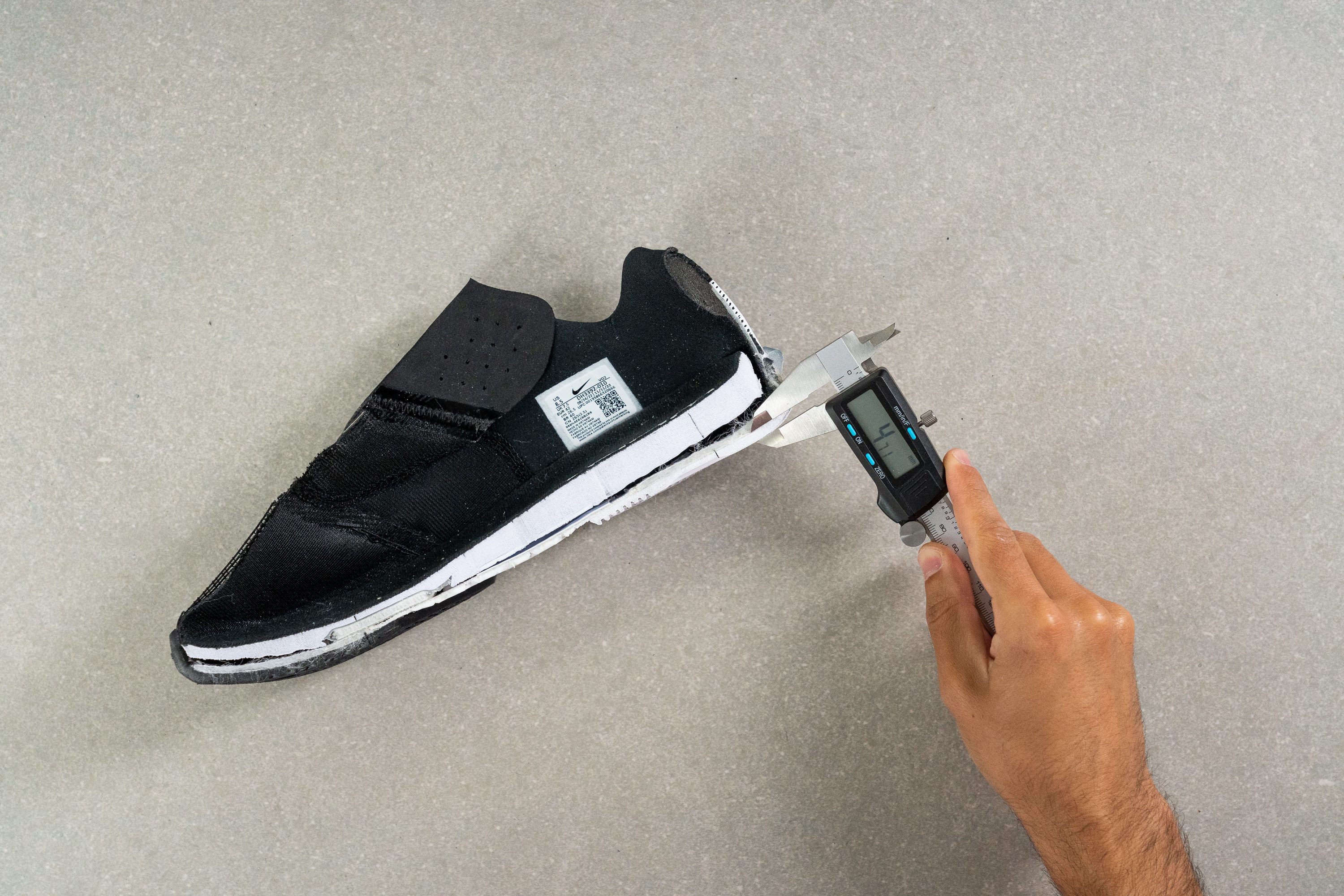
| Zoom Metcon Turbo 2 | 4.7 mm |
| Average | 3.6 mm |
Misc
Insole thickness
The Metcon Turbo 2 uses a drop-in midsole for cushioning. When measured alone, it has a heel height of 14.2 mm.
We do not recommend taking it out as it's going to leave you feeling practically barefoot.
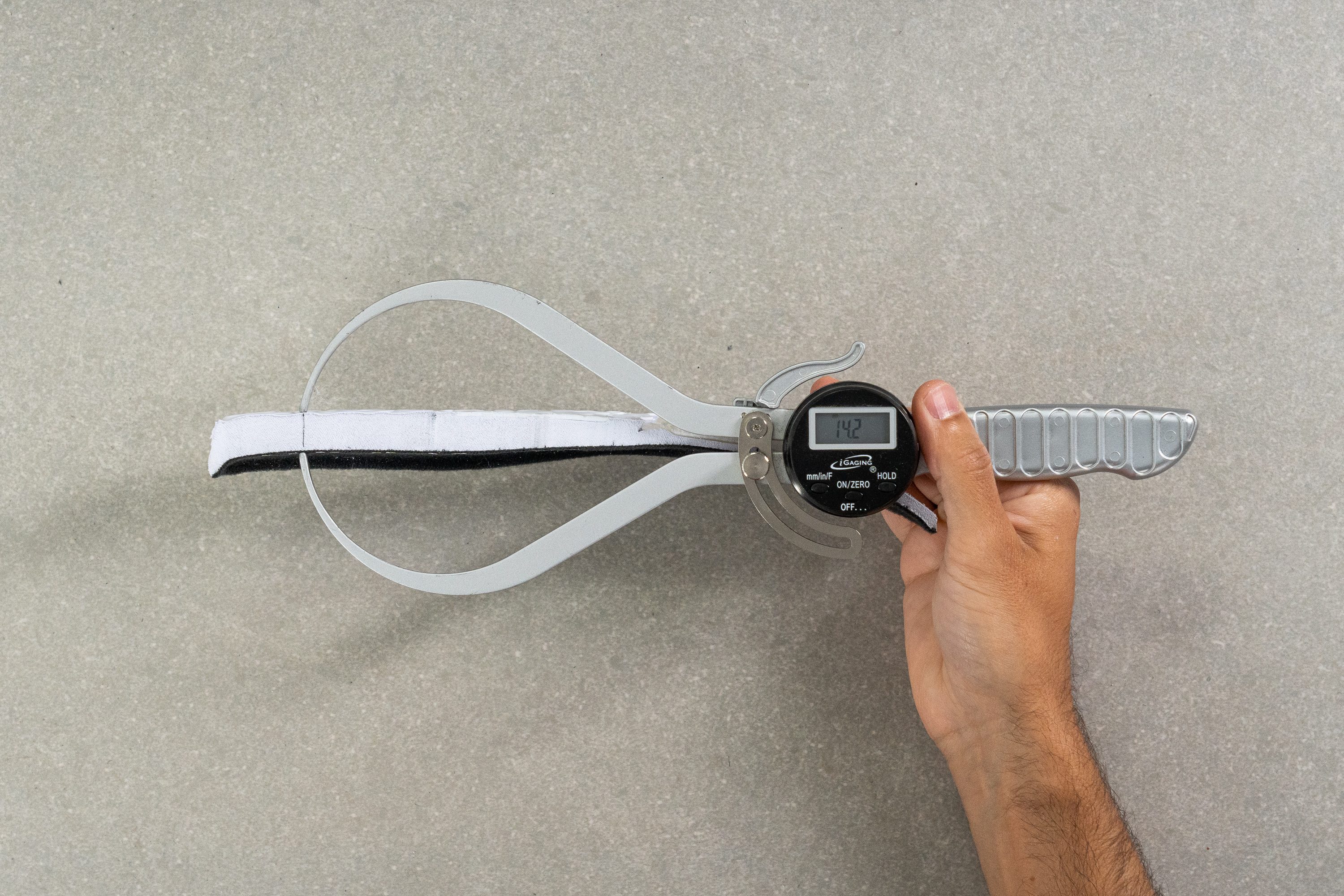
| Zoom Metcon Turbo 2 | 0.0 mm |
| Average | 4.0 mm |
Removable insole
Technically, you can remove the insole from the Metcon Turbo. But we wouldn't recommend it because it works as the shoe's primary cushioning. Not to mention that it also has the bouncy Zoom Air unit!
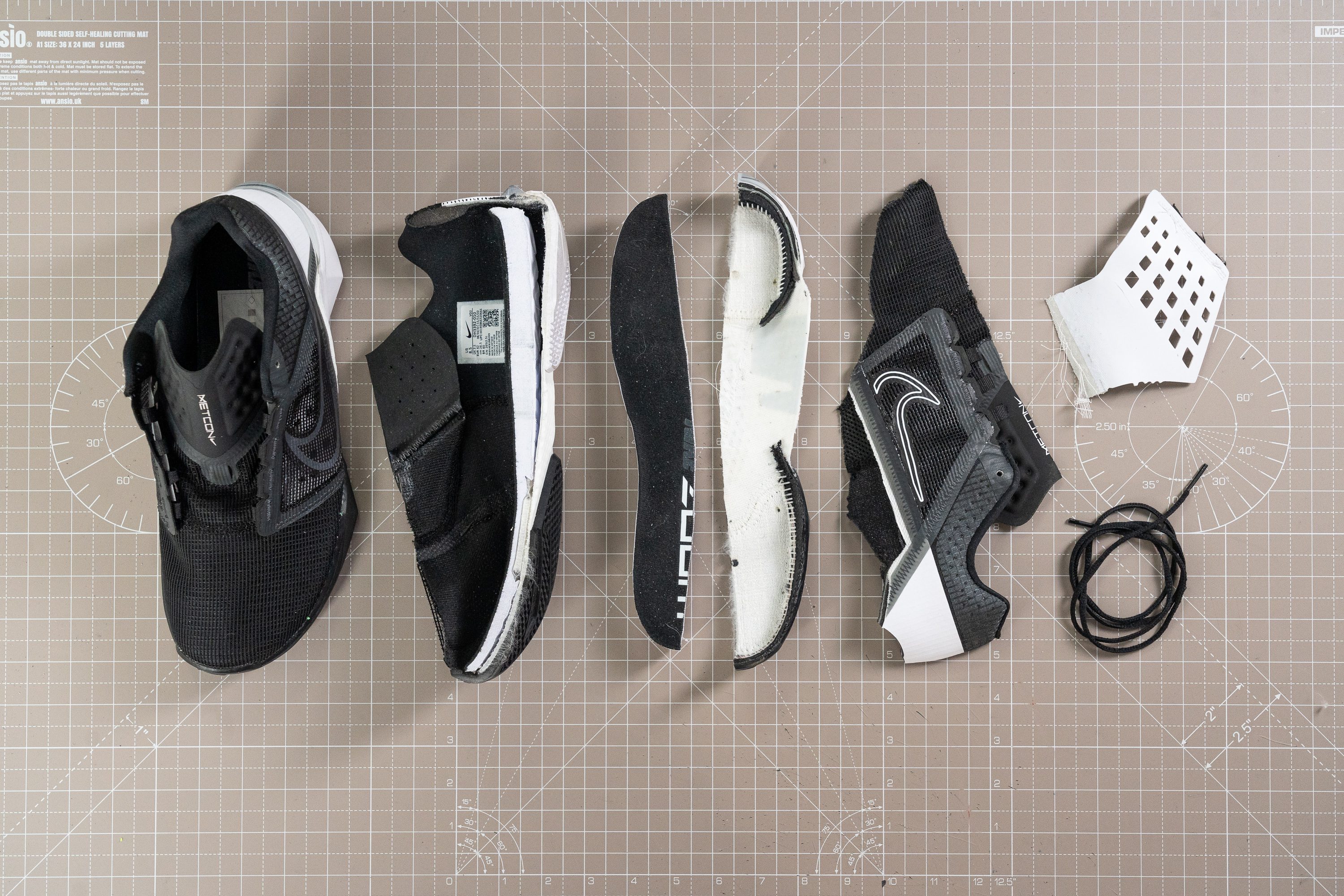
| Zoom Metcon Turbo 2 | Yes |
Tongue padding
The tongue is ultra-thin in the Nike Zoom Metcon Turbo 2. With a mere thickness of 1.2 mm, it feels non-existent compared to what we typically see.
For a trainer that's cut out for speed, we believe that it makes sense.
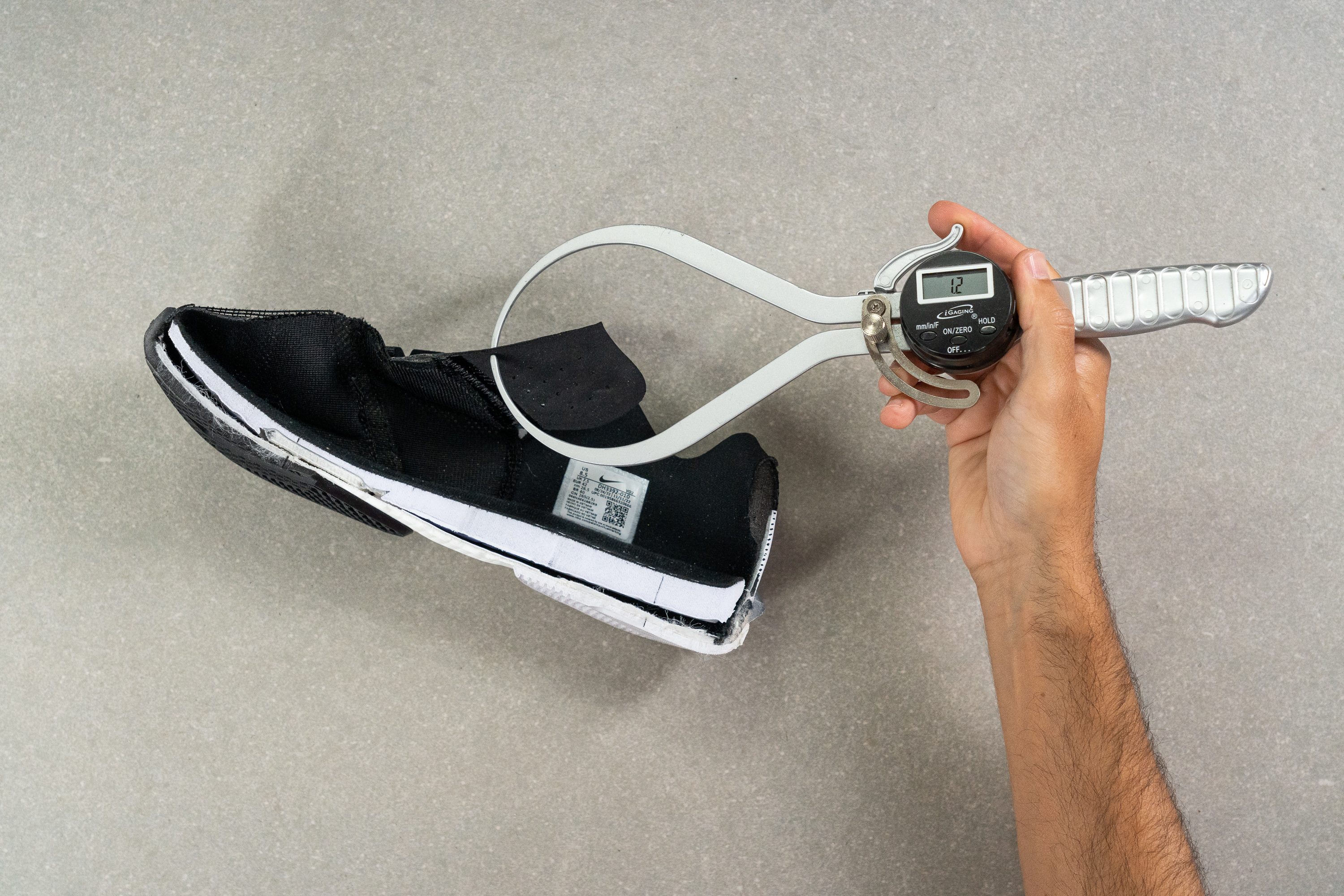
| Zoom Metcon Turbo 2 | 1.2 mm |
| Average | 5.7 mm |
Tongue: gusset type
Shout out to Nike for adding gusseted tongues to their training shoes!
Loving it in running shoes, we are happy to see more of them in trainers! This may seem like a minor add-on but we consider it essential for secure fit and non-slipping tongue.
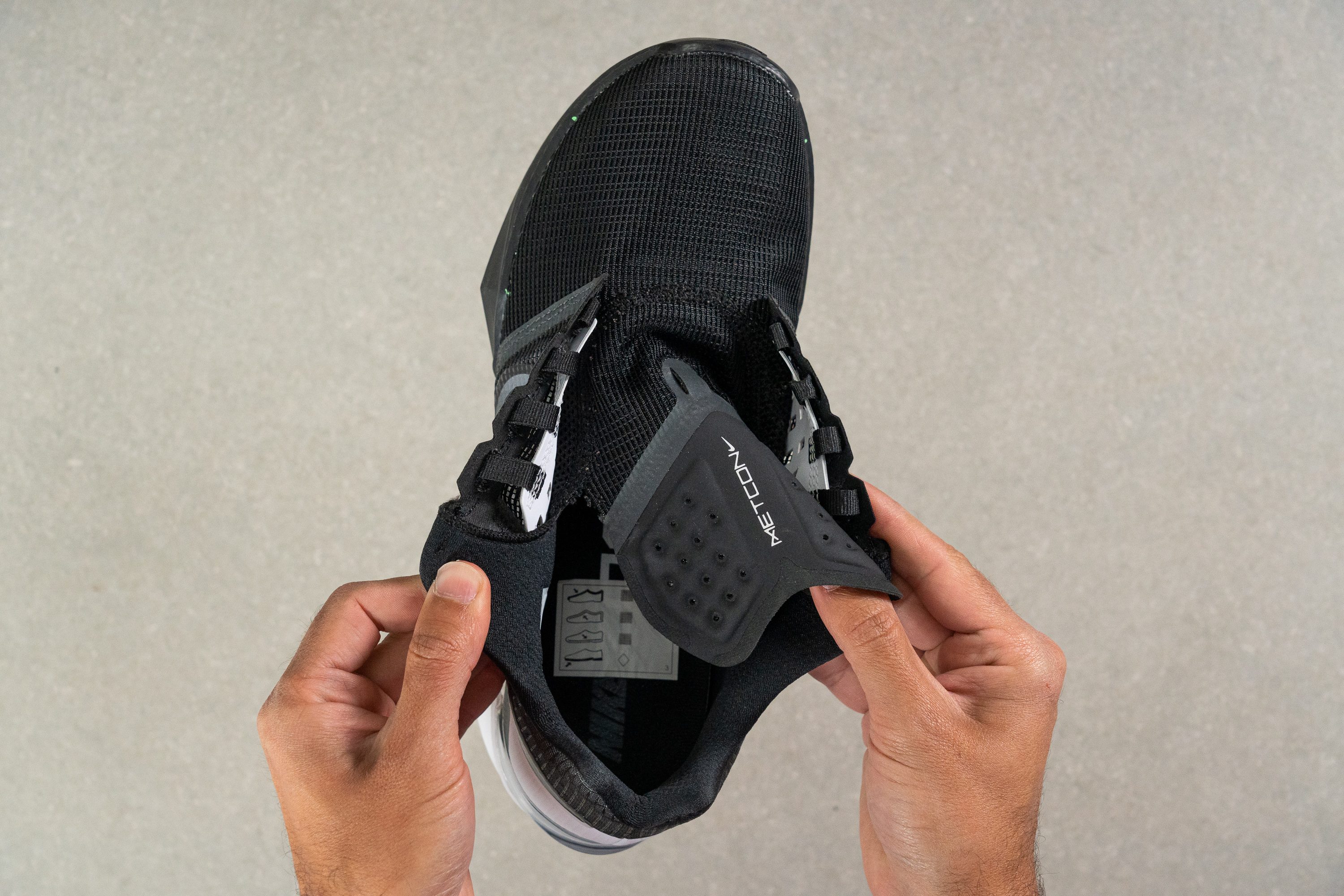
| Zoom Metcon Turbo 2 | Both sides (full) |
Heel tab
No heel tab here. But there is little effort needed to get the shoe on.
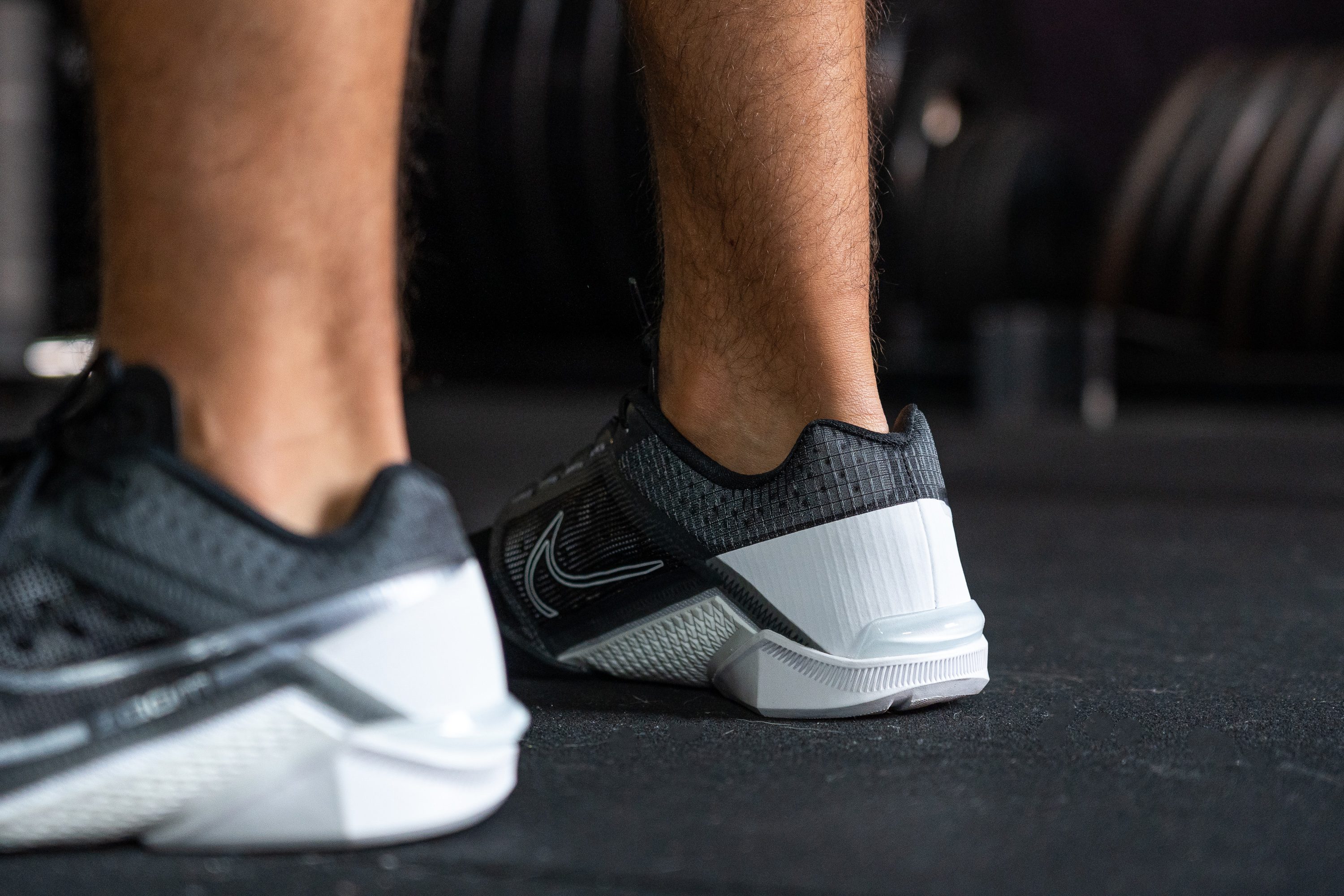
| Zoom Metcon Turbo 2 | None |

